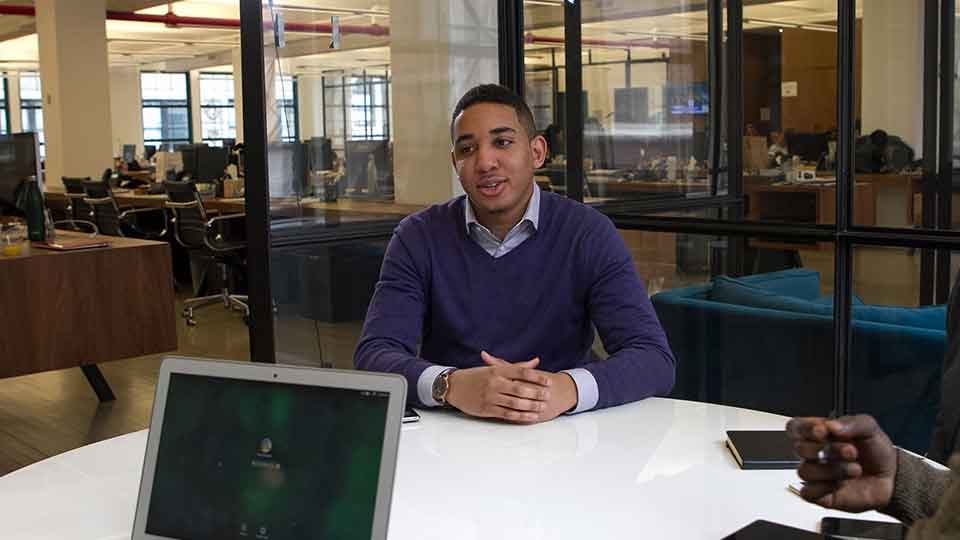
Interviewing for a job, huh? First off, congratulations! This is an exciting time in your career. Now is your opportunity to take action and make sure your next venture is exactly what you want.
Feel free to be selective over the next few weeks. You’ll want to make sure you give plenty of thought to each role. Every new beginning is an opportunity to grow. If you’re a great candidate (which I’m willing to bet you are since you’re doing some research), you’ll have plenty of paths to choose from.
Before you can officially begin choosing between job offers, though, you have to line them up.
To do so, you need to ace your interviews. Uh oh. . . that might be a problem?
Whether you’ve interviewed a lot or not, this can sometimes be easier said than done. Sure, some people are natural interviewers, never struggling to provide a thorough answer to even the most complex question.
If you’re anything like me however (and most of the candidates I’ve interviewed over the years), job interviews can be a nerve-wracking experience.
It’s not uncommon for candidates with an upcoming interview to wonder how to prepare, what questions will be asked and whether there’s a naturopathic solution to nerve-induced palm sweating. Did you know that’s called Palmar Hyperhidrosis? Yeah, it’s an actual medical thing. . .
This article will answer two of these three questions. First, you’ll receive a list of interview questions you may be asked during yours. Next, I included a few tips for preparing for your next interview. I’ve left the palm-sweating cure for another article. For now, use your pant leg.
What Are Interview Questions Meant to Measure?
Every interview is different, with various stakeholders talking to separate individuals about an array of positions. That said, at their core, employers conduct interviews to determine four major things:
- Whether the candidate can accomplish the job’s core functions and exceed within the role
- Whether the candidate’s values and mission align with the company’s
- Whether the candidate has committed themselves to truly understanding what it means to work for their company and where they fit within it
- Whether the candidate’s personality and soft skills align with the people they’ll be working most closely with
Interviewers at all stages of the process — for the phone screening and in-person interviews — structure their questions to reach these understandings. Below, we’ve broken questions down into five main categories, based on the information your interviewer is trying to garner.

Common Interview Questions
Your interviewer may ask you any mix of questions. That makes it impossible to guarantee exactly what you’ll be asked. That said, here are 42 questions broken down into the categories we defined above.
Questions About Job Proficiency and Work Experience
- Can you provide an overview of your previous work experience and how it relates to this position?
- What were your primary responsibilities in your most recent role?
- Could you describe a challenging project or task you completed successfully in your previous job?
- Have you ever had to work under tight deadlines or manage multiple projects simultaneously? How did you handle it?
- What metrics or goals were you responsible for achieving in your previous role, and how did you measure your success?
- How do you stay up-to-date with industry trends and developments relevant to your profession?
- Can you provide an example of a time when you had to adapt to changes in your job or work environment?
- Describe a situation where you had to collaborate with cross-functional teams or departments to achieve a common goal.
- What tools, software, or technology do you have experience using in relation to this position?
- How do you prioritize tasks and manage your time effectively to meet deadlines?
- Can you discuss a time when you identified an opportunity for innovation or efficiency in your previous role and how you implemented it?
- Have you ever been involved in a project that didn't go as planned? How did you handle it, and what did you learn from the experience?
These kinds of queries are raised with the intention of getting to know your professional experience, beyond what you put on your resume. While these might not be the exact questions you’re asked, expect to answer similar ones.
Questions About Culture Fit
- Can you describe the work environment or culture in which you thrive the most?
- What values are most important to you in a workplace?
- How would you describe your preferred style of collaboration and teamwork?
- Can you share an example of a time when you had to adapt to a new culture or work with a diverse group of colleagues?
- What type of work environment do you find the most challenging or uncomfortable, and how do you handle it?
- How do you typically approach building relationships with your colleagues and team members?
- How do you handle feedback and constructive criticism from supervisors or teammates?
- Can you describe a situation where you had to resolve a conflict or disagreement within a team?
- What role do you believe company values play in fostering a positive work environment?
- Can you share an example of when you went above and beyond to support your colleagues or contribute to a positive work culture?
Every company values its culture. It’s also interesting to note that most businesses feel their culture is “different.” For this reason, you will undoubtedly be questioned about how you’ve fit into companies, teams or communities in the past. Try to think of a few examples ahead of time.

Questions About the Future, Development and Goals
- How do you envision your career progressing over the next few years?
- Can you describe your long-term professional goals and how they align with this position?
- What steps have you taken in the past to further your professional development and enhance your skills?
- Can you provide an example of a time when you sought out new challenges or opportunities for growth in your previous role?
- What specific skills or knowledge areas do you hope to develop or improve upon in the future?
- Are there any certifications or training programs you plan to pursue to enhance your professional qualifications?
- Can you discuss a time when you proactively sought feedback or mentorship to help you reach your career goals?
- How do you balance short-term goals with long-term aspirations in your professional development plan?
- How do you define success in your professional career, and how will you know when you have achieved it?
- How do you see your role contributing to the future growth and success of our company?
Ambitious employees are really attractive to employers, which hope to create an environment for these people to thrive. As a job candidate, you want to ensure companies know how important professional growth is. That way, you can measure the degree to which these experiences will be available to you when working there.
Questions About Your Soft Skills
- How would you describe your communication style, and how do you adapt it to different audiences or situations?
- Can you provide an example of a time when you effectively resolved a conflict or disagreement with a colleague or team member?
- How do you handle feedback and criticism from supervisors or teammates? Can you provide an example of a time when you incorporated feedback to improve your performance?
- Can you describe a situation where you had to collaborate with a diverse group of individuals to achieve a common goal?
- Can you share an example of when you demonstrated strong leadership skills, either in a formal or informal capacity?
- How do you handle working under pressure or in high-stress situations, and how do you maintain composure and productivity?
- How do you approach problem-solving and decision-making? Can you provide an example of a challenging problem you solved?
- Can you describe a situation where you demonstrated exceptional teamwork and collaboration skills?
- How do you handle ambiguity or situations where there is no clear solution or direction?
- How do you handle working with individuals who have different work styles, perspectives or opinions from yours?
There’s a difference between a job candidate’s objective ability to perform job duties and their soft skills — skills like leadership, communication, teamwork, problem solving and critical thinking. Often, soft skills are a better representation of a job candidate’s fit organizationally than anything else, making it imperative for employers to measure it.

How to Prepare To Answer Interview Questions
Any number of these questions may appear during your next job interview. That said, this isn’t a comprehensive list; there are plenty of other questions you could be asked. Many of my colleagues have lists of questions they like to ask employees. These lists typically stem from the type of role they’re hiring for. Sales managers, for example, ask different questions from those posed by members of our accounting team.
For this reason, to ensure you’re prepared for the next job you interview for — regardless of your specialty — here are some tips to employ:
- Think about how to summarize your professional and educational experience in a way that reflects your ability to perform in the position you’re interviewing for.
- Reflect on your past triumphs and difficulties professionally. You will almost certainly be asked to speak about both of them.
- Do your research on each employer and learn their history, values and mission statement. Think about how these align with your own beliefs and priorities.
- Thoroughly read the job description and identify where your skills match and any areas you’re lacking in. Be prepared to speak about each of these.
- Practice articulating your answers to questions in the following categories: skills, strengths, weaknesses, teamwork, work experience, problem-solving and goals.
- Practice answering questions by crafting concise, structured responses using the STAR method (Situation, Task, Action, Result).
Employing each of these tactics will make you more confident during your next interview. But that doesn’t mean there won’t still be some nerves. You see, answering questions confidently and concisely is only a portion of acing your interview.
Let’s talk about your next step. . .
Ace your Next Interview: A Free Resource
Now you have a list of questions to practice answering and some tips for getting better at doing so. Next, let’s make sure you have the other tools you need to crush your next interview.
There are several things you can do before, during and after your job interviews to stand out — answering questions is only one of them. Download the Interview Etiquette Guide: 13 Tips For Crushing Your Next Interview for a structured breakdown of everything you must consider to ace every job interview.



